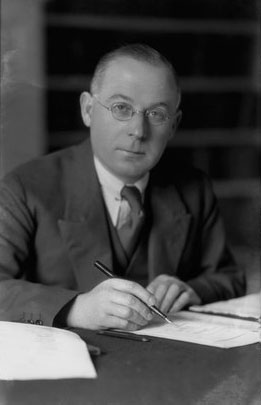Frank Adcock facts for kids
Quick facts for kids
Frank Adcock
|
|
|---|---|
 |
|
| Born | 15 April 1886 Desford, Leicestershire, England
|
| Died | 22 February 1968 (aged 81) |
| Nationality | British |
| Title | Professor of Ancient History |
| Scientific career | |
| Institutions | University of Cambridge |
Sir Frank Ezra Adcock (born April 15, 1886 – died February 22, 1968) was a British historian. He studied and taught about ancient times. Sir Frank was a Professor of Ancient History at the University of Cambridge from 1925 to 1951. Besides his work as a professor, he also worked as a secret code-breaker. He helped break codes during both World War I and World War II.
Contents
Early Life and Education
Frank Adcock was born in Desford, Leicestershire, England. This was on April 15, 1886. His father, Thomas Draper Adcock, was the head of a school. Frank went to Wyggeston Grammar School in Leicester. Later, he studied classics (which means ancient Greek and Roman history, languages, and cultures) at King's College, Cambridge.
Career Highlights
Academic Work
In 1911, Frank Adcock became a fellow and lecturer at King's College, Cambridge. A fellow is like a senior member of the college. He taught history there for many years. From 1925 to 1951, he held the important position of Professor of Ancient History at Cambridge University.
He also helped edit a big history book series. It was called The Cambridge Ancient History. This series was published between 1923 and 1939. He even wrote ten chapters for it himself.
Sir Frank was also the president of two important groups. He led the Society for the Promotion of Roman Studies from 1929 to 1931. He was also president of the Classical Association from 1947 to 1948. These groups help people learn more about ancient Rome and other classical topics.
Secret Military Service
Sir Frank Adcock also used his skills to help his country. During World War I, from 1915 to 1919, he worked for the Intelligence Division of the Royal Navy. He was a lieutenant-commander in the Royal Navy Volunteer Reserve. His main job was to interpret secret codes and ciphers. He worked in a special place called Room 40 at the Admiralty. This was a top-secret unit that broke enemy codes.
Later, during World War II, he continued his important work. From 1939 to 1943, he worked at Bletchley Park. This was the main center for British code-breaking during the war.
Honours and Awards
Sir Frank Adcock received several important awards for his work.
- In 1918, he was made an Officer of the Order of the British Empire (OBE). This was for his services during World War I.
- In 1936, he was chosen as a Fellow of the British Academy (FBA). This is a very high honour for scholars in the humanities and social sciences.
- In 1954, he was given the title of Knight Bachelor. This means he became "Sir Frank Adcock." Queen Elizabeth The Queen Mother officially knighted him at Buckingham Palace.
Later Life
Sir Frank Adcock passed away on February 22, 1968. He died at King's College, Cambridge, where he had spent so much of his life studying and teaching.
 | Leon Lynch |
 | Milton P. Webster |
 | Ferdinand Smith |

